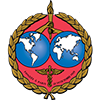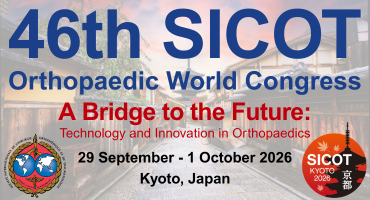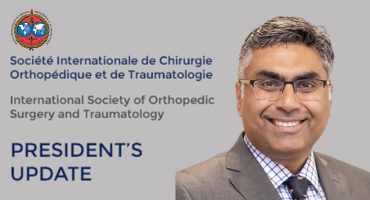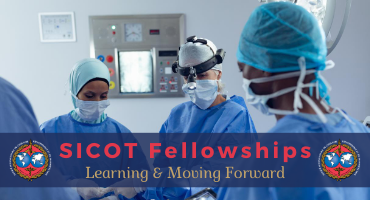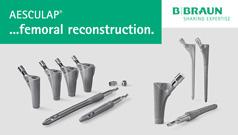Fellowship News
The SICOT fellowship: a new paradigm for hospitals and doctors around the world
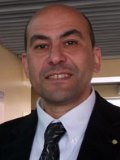 Khaled Emara SICOT Fellowship Committee Chairman - Cairo, Egypt |
Having a fellowship training in a different country is a life changing experience
Even now, I recall after finishing my training thinking “now I know everything orthopaedics has to offer!”. A few months later, I looked up a limb reconstruction fellowship abroad and decided “why not, It’s going to be a piece of cake, after all, I’ve seen just about everything during my extended residency training”. But as you can guess by now, it was no walk in the park. In fact, it was life changing. Let’s just say that it challenged most if not all of the concepts I learned during my training,
I think fellowships should be viewed as a chance to spend a whole year under close observation and in direct contact with a mentor, not only to absorb knowledge and surgical techniques, but also to absorb wisdom of experience both in orthopaedic surgery and sometimes more importantly in life as an orthopaedic surgeon like how to think, how to operate, how to deal with patients, and much more. By the end of my fellowship I became friends with my mentor, to whom I remain grateful for opening so many doors for me, as well as introducing me to a completely different world! A much larger one than this limited world that I was familiar with during my training. That of course, in addition to it being a great chance for exposure to different cultures, different people, different ways of life make fellowships abroad an indispensable experience to mature as a surgeon and, sometimes more importantly, as a person.
After a few years, I started a fellowship program, and gradually many doctors from all over the world joined, each leaving his unique print, and leaving with an exceptional experience. I remain proud, as part of my department as well as individually on a personal level, of the number of friends and connections made through fellowships and exchange programmes. That, along with the quality education we have provided throughout the years, has greatly contributed to the value of our orthopaedic surgery department both regionally and internationally.
Orthopaedic training is not just some information and surgical steps
Training in Orthopaedic surgery is a combination of knowledge, skills and attitude. The knowledge part could be acquired from books, lectures, instructional courses, or even from watching instructional videos and information on the internet. However, the implementation of knowledge in the form of skills and attitude is a totally different story that requires personal contact with a more senior, wise and experienced colleague.
An excellent Orthopaedic surgeon knows how to deal with patients, how to analyze medical problems, connect the dots to reach the proper decision, as well as perform more advanced and specialized surgery. Excellent doctors know how to use evidence based medicine in helping their patients and implement the best available evidence within the bounds of available medical skills and equipment, to satisfy the patient’s needs. This leads us to another point: in the 21st century, orthopaedic surgeons are not only required to treat patients with up to date knowledge and skills, but are also expected to be part of the system that produces this evidence based updated knowledge. Therefore, the concept of the skilled surgeon who is only good at his practice without contributing via research and publications is fading away by the day. Always try to be a generator of knowledge, not just a good consumer. Afterwards, a highly effective surgeon will move on to the next step: transferring knowledge and skill as well as effectively communicating with both medical and non-medical personnel including the patient himself.
Hospitals and research centres need visiting fellows from abroad, even more than the fellows need them!
SICOT is the largest orthopaedic scientific organization including members from 144 different countries around the world. That gives SICOT many advantages, but it also places a huge amount of responsibility on SICOT to live up to the standards expected from such an institution.
There is a huge amount of centres worldwide with vast clinical and scientific expertise. These centres create a demand that can only be satisfied by the multitude of young orthopaedic surgeons in need of acquiring more skills and exchanging experiences with peers and senior doctors all over the world.
In SICOT we believe that it is our duty to help training and research centres around the world who provide high quality care and education to gain the recognition they deserve as well as provide the opportunity for aspiring orthopaedic surgeons to travel out of their narrow scope and attain knowledge and experience that could never be gained at their home centres regardless of how qualified or renowned their home institutions may be.
That is why the SICOT Fellowship Committee has decided to implement a new project aiming at expanding the number of fellowship training centres recognised by SICOT from countries all over the world. We call for any centre around the world interested in getting SICOT fellows for training to contact us and apply.
Our application deadline will be 1 May 2018. All applications will be reviewed and selected centres will receive requests for more information after the deadline which will include details about the centre, specialty, surgical load, number of patients, surgical theaters, research productivity, education and what exactly this center can offer potential trainees, and so on. The centre is required to have at least one or two SICOT members for review, contact, and continuous assessment.
On the other hand, this increase in the number of SICOT training centres will be associated with an increase in the acceptance rate of new SICOT fellowship applicants. It goes without saying that assessment will be made by the committee according to clear and fair criteria, with full transparency. The basic requirement for the eligibility of any trainee to apply for a fellowship position is SICOT membership as well as a Certificate of Attendance of any SICOT Congress. The presence of these requirements does not guarantee a position. Acceptance into the programme will include a thorough review of each applicant’s potential, qualifications, and so on. However, the two previously mentioned criteria are the bare minimum for application.
I advise all orthopaedic surgeons to follow us on the SICOT website or contact us during the coming year to apply either as a trainee or as a training centre.
Our contact email is: [email protected]
Good luck!
